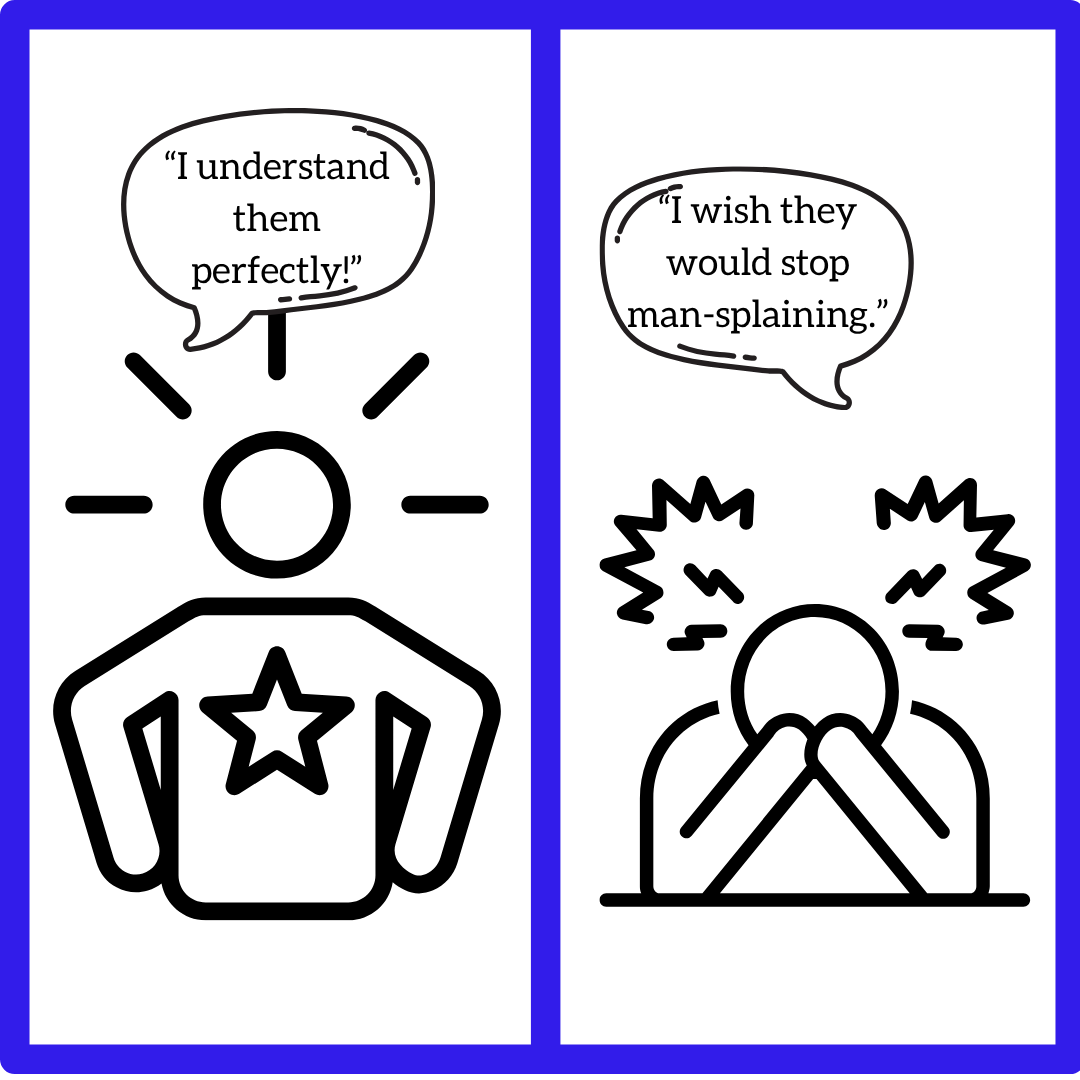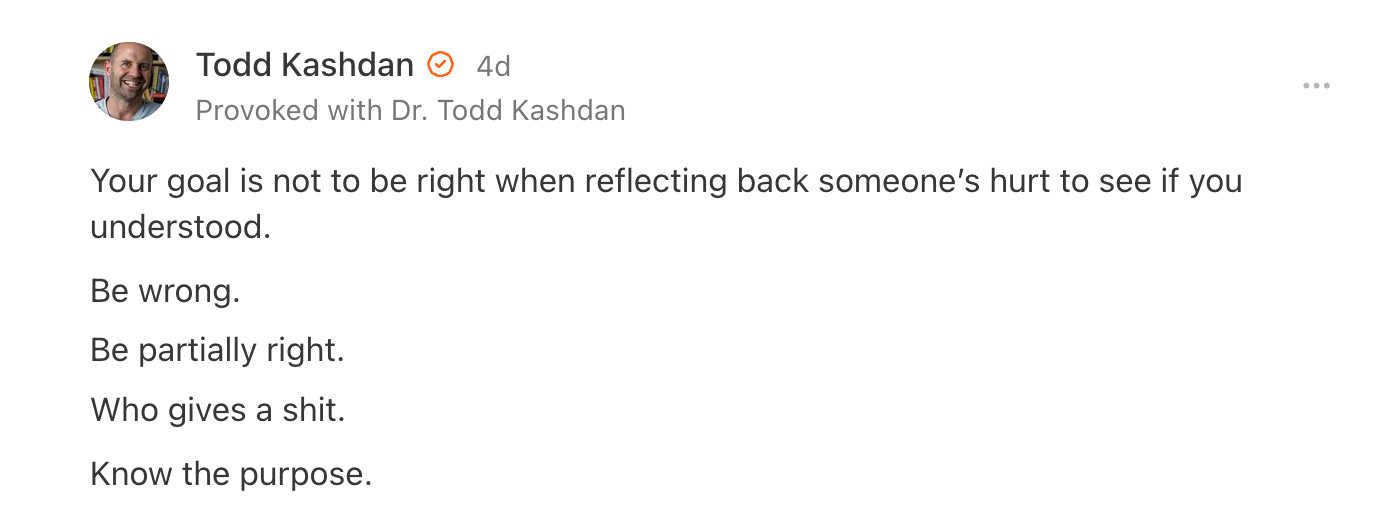Your friend: Shares something vulnerable, like “I’ve been having a hard time at work. It’s just been too much and I’m anxious all the time about losing my job.”
You: Dutifully channeling your inner therapist, "So you're feeling overwhelmed because work is demanding too much and you're worried you can't keep up."
Your friend: "No, that’s not what I meant..."
Cue the conversational equivalent of a record scratch. Your friend, despite your efforts to put validation advice into practice, doesn't feel heard. And you are left wondering how you ended up being the villain in this validation story.
Welcome to the world of "you-splaining,"where good intentions meet faulty execution.
Accidentally acting like the expert on someone else's life
Common guidance to validate overlooks an important issue: confidently interpreting someone's experience back to them causes us to inadvertently position ourselves as the expert on their inner world. It's like being a tour guide for someone else's emotional landscape, except they live there and you're just visiting with a day pass.
The fact is, we're all a little territorial about our experiences because being the authority on our own inner world isn't just a preference; it's a fundamental human need. It’s right up there with food, shelter, and the right to explain why you liked that movie everyone else hated.
The importance of our fundamental drive for agency was theorized in “self-determination theory” and has decades of research supporting it.1 It’s a theory of human motivation that highlights how our basic psychological needs include feeling a sense of agency. It’s so fundamental that when our agency is undermined, our inner two-year-old wakes up and insists that the other person is wrong.
Have you ever had someone confidently explain your own feelings to you? How did that land? If you're like most humans, your inner response was probably some version of "Excuse me, but who died and made you the CEO of my emotional experience?"
For most of us, it feels like the emotional equivalent of someone editing our diary while we’re still writing it.
How strategic uncertainty can save the conversation
In studies investigating psychotherapy outcomes, evidence shows that overconfidence in understanding seems to be an important predictor, but not in the way you’d think. Overconfidence predicts poorer outcomes, while what researchers diplomatically call "healthy self-doubt" about one's interpretive skills seems to predict better outcomes.
That is, therapists who remain intellectually humble—who express tentativeness rather than certainty—create more connection and felt understanding, not less.
The paradox, of course, is that the more confident we appear about someone else's inner experience, the less understood they're likely to feel. Meanwhile, when we acknowledge that we might not have it exactly right, people usually end up feeling better understood than when we assume we've nailed it perfectly.2
Rather than delivering confident interpretations like you're reading from someone's emotional medical chart, a tentative approach sounds like:
"Is it something like...?"
"It sounds like maybe...?"
"I'm getting the sense that... am I tracking with you?"
"Help me understand what I might be missing here"
These small linguistic shifts accomplish something quite powerful: explicitly acknowledging the other person as the expert on their own experience while still demonstrating that you're actively listening and trying to understand.
From the therapy room
In couples therapy, I often see this dynamic play out in predictable ways. One partner works on being more receptive to connection attempts, while the other learns to be less authoritative in their interpretations—essentially practicing the art of distinguishing between their experience of their partner and their partner's experience of themselves.
The shift typically sounds like moving from "You always tune me out when you're on your phone because you don't care about what I'm saying" to something like "I feel disconnected and like you don’t care about me when you're on your phone, but I don’t want to assume the same is true for you. What’s going on for you in those moments?"
Same observation, completely different impact. One invites collaboration; the other demands surrender.
Practice makes... less awkward?
I encourage you to experiment with trying to catch yourself when you're about to deliver a confident interpretation of someone's experience. In that moment, consider pausing and phrasing it more tentatively. See if the conversation shifts when you explicitly invite the other person to remain the narrator of their own story. Because when we make space for people to correct us, they may feel less of a need to do so (plus, it’ll sting less if they do).3
The goal isn't perfect understanding; it's collaborative understanding. And when it comes to helping people feel truly heard, success isn't about proving how well we understand. It's about creating space for people to feel seen without having to surrender authorship of their own experience.
As my colleague and fellow Substack writer,
, perfectly put it:Don’t aim to be an emotional fortune teller. Aim to be a good partner in the ongoing conversation that is human connection.
And hey, if this resonated with you (see what I did there? I'm not assuming it did), hit that like button and share this with someone who needs to stop being the emotional fortune teller in their relationships. You know who they are. We all know who they are. They probably "fixed" your feelings at least once this week.
(PSA: Share responsibly—some people aren't ready to learn they've been you-splaining. But that's their journey to take.)
It’s a bit dated, but one of my favorite psychology books is Why We Do What We Do by Edward Deci (one of the founders of self-determination theory). If you are a parent, I HIGHLY recommend it (even though it isn’t technically about parenting).
Shower thought: Does anyone else wonder why all of human psychology seems to be built on paradox?
Pro-tip from my own validation fails: I sometimes use this strategy excessively with the clients who routinely tell me I’m wrong. If I state, at the outset, “I’ll probably get this at least a little wrong,” then I don’t feel as cut down when they tell me I didn’t. You’re welcome for this ego-saving tip.






I really appreciate this. I also love footnote 2: "Shower thought: Does anyone else wonder why all of human psychology seems to be built on paradox?" One of our philosophy department's learning goals is that students gain some comfort living with ambiguity--because there's so much of it! (Ambiguity isn't the same as paradox, but in this context they're cousins.)
Just to put it I feel like I am stuck in some kind of ruckus. I don't want to live where I am living right now, I haven't started my professional career in Law in which I did my Bachelors. I have been living with my parents for the last couple of years since I graduated. Time has ticked away, doing chores at home, helping father in his business and doing tons of other things. And I keep saying to them you are not understanding that you people are taking a lot of time away & what good I can make out of my life when I haven't got adequate time. Now I have totally understood that they won't be able to understand and used to talk to my friends a lot that this isn't going right kind of things. I have stopped talking to my friends regarding all this stuff as I got a glimpse that they give advice and don't understand what kind of ruckus I am going through. There came a time when I stopped sharing it my sister as well even though she is the only person with whom I try to share the most. I don't know if I will get out of this turmoil, but I have to put in the work and have to take now agency for everything as nobody is going to understand and create the life I want.